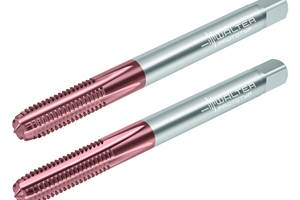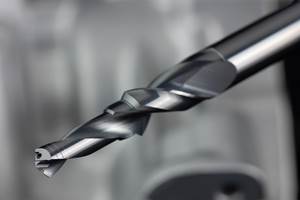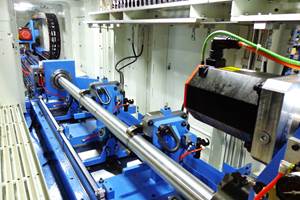CMM Locks In Inspection And Productivity
This company, established more than 140 years ago, manufactures a high volume of brass padlocks annually. They are made on two large rotary transfer machines with drilling capabilities. The company is also doing reverse engineering for tooling purposes for other machines it uses in its manufacturing and assembly departments.
Share




Hwacheon Machinery America, Inc.
Featured Content
View More



The Wilson Bohannan Company (Marion, Ohio), established more than 140 years ago, manufactures a high volume of brass padlocks annually. The locks, primarily used in industrial and utility applications, are sold as the WB brand. They are made on two large rotary transfer machines with drilling capabilities. The company is also doing reverse engineering for tooling purposes for other machines it uses in its manufacturing and assembly departments.
The company's primary mode of inspection was to check diameters and hole locations by using a combination of pin gages and a special fixture fitted with dial indicators on a granite surface plate. The pin gages checked the diameters and the fixture checked the hole location.
"Total inspection time was 3 to 4 hours, which greatly hindered production because the unit that machines the parts is set up and unable to be released for production until the first ten pieces are successfully inspected and approved," explains Mark Williams, vice president of engineering.
"The inspection process was delaying the machine start up, which in turn was reducing our production yield," he continues. However, there were more problems than just the initial runs. "After start up, we would perform periodic checks of parts, but we would continue to run the machine because of the lengthy inspection process. Because our inspector couldn't check enough parts to ensure the quality we demanded, we were never completely comfortable with the results."
To make matters worse, there are areas of the holes, such as at the bottom of the 0.111-inch diameter tumbler pinholes, which are difficult to access and therefore required destructive testing. "We had to cut apart locks to make accurate measurements," says Mr. Williams. It was clear that this inspection process had to change.
Mr. Williams evaluated the company's fairly demanding accuracy requirements (hole diameter ± 0.001 to 0.002 and repeatability 0.0005), which was very important. Then he took into consideration physical attributes of the part and access to holes, both of which presented positioning and measuring approach problems.
"The lock tumbler pinholes had an opening of only 0.111 inch at the top and were 5/8 inch deep, the diameter of the hole at the bottom being critical," says Mr. Williams. "When we realized there was no way to conventionally hold the part and take measurements reliably and productively with repeatability, we began to see that a CMM that was direct computer controlled (DCC), eliminating human intervention, would probably be our only alternative."
Still, there were hurdles to get over, such as size. The CMM probe stylus tip alone is 0.080 inch, leaving a mere 0.015 clearance around the ruby tip in the hole. "Once we found that the CMM offered a reliable fixturing base, that the stylus cleared the holes and that the measuring routines were automated and highly accurate, there was no doubt in my mind," says Mr. Williams. "A CMM was the only way to go."
After carefully reviewing various CMMs, Mr. Williams selected a Starrett Premis DCC model, with a 20-18-16-inch (X, Y, Z) measuring envelope and Starrett Apogee Software. "We went with the Starrett CMM for a variety of reasons, but primarily because of the machine design and construction."
Another important benefit the Starrett system provides is the ability to deploy reverse engineering through the Apogee software. "Apogee improves productivity and accuracy," says Mr. Williams. "Now when we develop a new part, we do it first on the CAD system and export the CAD file in IGES format. Then we import the file to the Premis, grab the holes and diameters and make instant inspections or evaluations. Apogee works really nice—it's so much easier for the operator to write and run part inspection programs."
Since their inspection process changed, Wilson Bohannan has seen the difference. "The Starrett CMM has reduced the time it takes to inspect our locks to just a few minutes, which greatly saved on work hours," says Mr. Williams.
The company has also been able to deliver a higher quality product more consistently, which is high on its radar screen. "We now inspect locks with a higher level of accuracy," says Mr. Williams. "We have had very few problems and no regrets. In fact, our system was already paid for through productivity gains in the first 2 years."
Related Content
Walter Offers New Solid-Carbide Taps for Blind-Hole Machining
Walter’s TC388 Supreme and TC389 Supreme feature patent-pending cutting geometries that fully shear off the root of the chip when reversing, thus minimizing torque peaks.
Read MoreEmuge-Franken's New Drill Geometry Optimizes Chipbreaking
PunchDrill features patent-pending geometry with a chipbreaker that produces short chips to control machining forces.
Read MoreKay Engineering's Gundrilling Machine Performs Range of Operations
Kay Engineering’s DeHoff 20144 is used to perform gundrilling, pull boring, roller burnishing and thread tapping.
Read MoreHeule Tool Enables Spot Facing of Difficult-to-Reach Areas
The manually actuated bkac spot facing tool is well suited for large boring mills and other open-air machines.
Read MoreRead Next
5 Rules of Thumb for Buying CNC Machine Tools
Use these tips to carefully plan your machine tool purchases and to avoid regretting your decision later.
Read MoreRegistration Now Open for the Precision Machining Technology Show (PMTS) 2025
The precision machining industry’s premier event returns to Cleveland, OH, April 1-3.
Read MoreBuilding Out a Foundation for Student Machinists
Autodesk and Haas have teamed up to produce an introductory course for students that covers the basics of CAD, CAM and CNC while providing them with a portfolio part.
Read More




































.jpg;maxWidth=300;quality=90)











